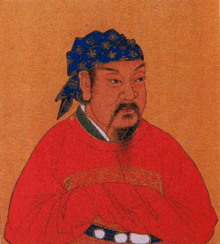422
| Millennium: | 1st millennium |
|---|---|
| Centuries: | 4th century · 5th century · 6th century |
| Decades: | 390s · 400s · 410s · 420s · 430s · 440s · 450s |
| Years: | 419 · 420 · 421 · 422 · 423 · 424 · 425 |
| 422 by topic | |
| Politics | |
| State leaders – Sovereign states | |
| Birth and death categories | |
| Births – Deaths | |
| Establishment and disestablishment categories | |
| Establishments – Disestablishments | |
| Gregorian calendar | 422 CDXXII |
| Ab urbe condita | 1175 |
| Assyrian calendar | 5172 |
| Bengali calendar | −171 |
| Berber calendar | 1372 |
| Buddhist calendar | 966 |
| Burmese calendar | −216 |
| Byzantine calendar | 5930–5931 |
| Chinese calendar | 辛酉年 (Metal Rooster) 3118 or 3058 — to — 壬戌年 (Water Dog) 3119 or 3059 |
| Coptic calendar | 138–139 |
| Discordian calendar | 1588 |
| Ethiopian calendar | 414–415 |
| Hebrew calendar | 4182–4183 |
| Hindu calendars | |
| - Vikram Samvat | 478–479 |
| - Shaka Samvat | 343–344 |
| - Kali Yuga | 3522–3523 |
| Holocene calendar | 10422 |
| Iranian calendar | 200 BP – 199 BP |
| Islamic calendar | 206 BH – 205 BH |
| Javanese calendar | 306–307 |
| Julian calendar | 422 CDXXII |
| Korean calendar | 2755 |
| Minguo calendar | 1490 before ROC 民前1490年 |
| Nanakshahi calendar | −1046 |
| Seleucid era | 733/734 AG |
| Thai solar calendar | 964–965 |
| Wikimedia Commons has media related to 422. |

Emperor Wu Di (420–422)
Year 422 (CDXXII) was a common year starting on Sunday (link will display the full calendar) of the Julian calendar. At the time, it was known as the Year of the Consulship of Honorius and Theodosius (or, less frequently, year 1175 Ab urbe condita). The denomination 422 for this year has been used since the early medieval period, when the Anno Domini calendar era became the prevalent method in Europe for naming years.
Events
By place
Roman Empire
- End of the Roman–Sassanid War: Emperor Theodosius II signs a 100-year peace treaty with Persia after 2 years of war. He agrees a status quo ante bellum ("the state in which things were before the war"), and both parts guarantee liberty of religion in their territories.
- March 3 – Theodosius II issues a law to form provisions in peacetime. He instructs landowners leasing towers in the Theodosian Walls to assist with the build-up of emergency goods. Theodosius pays an annual tribute of 350 pounds of gold to the Huns in order to buy peace.[1]
- Theodosius II receives a statue at Hebdomon, military parade ground on the shores of the Propontis, just outside Constantinople. On its base (fragments are now in the Istanbul Archaeology Museum), an inscription praises him as “everywhere and forever victorious.”
- The walls of Rome's Flavian Amphitheater (Colosseum) crack during an earthquake.
Europe
- The Roman army invades Gaul; they capture and execute the Frankish king Theudemeres with his family.
Asia
- Shao Di, age 16, eldest son of Wu Di, succeeds his father as emperor of the Liu Song Dynasty (China).
By topic
Art
- Petrus, bishop of Illyria, starts construction of the Church of Santa Sabina (approximate date).
Religion
- September 4 – Pope Boniface I dies after a 4-year reign that was interrupted for 15 weeks, by the faction of the antipope Eulalius. He is succeeded by Celestine I as the 43rd pope.
Births
- Casper, ruler of the Maya city of Palenque
- Genevieve, patron saint (approximate date)
- Licinia Eudoxia, Roman empress (d. 462)
Deaths
- Abraham of Cyrrhus, Syrian hermit and bishop
- Fa-Hien, Chinese Buddhist monk and traveler (approximate date)
- September 4 – Pope Boniface I
- Theudemeres, king of the Franks (approximate date)
- Wu Di, emperor of the Liu Song Dynasty (b. 363)
References
- ↑ The End of Empire (p. 87). Christopher Kelly, 2009. ISBN 978-0-393-33849-2
This article is issued from Wikipedia - version of the 9/8/2016. The text is available under the Creative Commons Attribution/Share Alike but additional terms may apply for the media files.